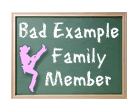So the last time I sat down to write to you all, I said that I'd been at the library looking up information. And I pretty much tried to scare you away by saying that you'd see more about it. Well since then (it's been a tad busy at my house), I've decided to really scare you all.
Just about three and a half years ago I started looking for information on mathematical cognition. The search started with a book recommended to me by a high school principle, lead to a research project and rather long (one hour) presentation, and then became something of an obsession. The biggest problem I’ve been having is that the bulk of the research being done on mathematical cognition looks at arithmetic but not mathematics (geometry, algebra, and so forth). I have a couple of other problems right now. The first is that the more I’ve looked at one of the few theories of mathematical cognition that addresses “higher” mathematics, the more I think they’ve got it wrong. The other problem is my lack of access to people who study the subject which means that I can come up with all kinds of ideas, but have no way to get any feedback.
(And if I actually ever arrived at a coherent theory, I’d have no way of testing it. But I guess that’s another story.)
The lack of feedback leads directly to all of you. I decided to pretty much write papers and put them here for your comments, questions and ability to find the holes in my logic. There are a number of areas to looks at – the evolution and development of the brain and of cognition in general, the historical development of mathematics, studies of brain “use” while doing mathematics (or arithmetic), studies of mathematical learning disabilities, and possibly the effect of changes in society.
I’ll post the first of these “papers” in the next few days. Just to get it out of the way, I’ll talk about my ideas of whether or not mathematics is a language and whether or not mathematical cognition can be understood that way. (Aren’t you just way too excited?)
In the meantime, here are the definitions for arithmetic and mathematics from The Oxford English Dictionary, Second Edition (1989).
(And if I actually ever arrived at a coherent theory, I’d have no way of testing it. But I guess that’s another story.)
The lack of feedback leads directly to all of you. I decided to pretty much write papers and put them here for your comments, questions and ability to find the holes in my logic. There are a number of areas to looks at – the evolution and development of the brain and of cognition in general, the historical development of mathematics, studies of brain “use” while doing mathematics (or arithmetic), studies of mathematical learning disabilities, and possibly the effect of changes in society.
I’ll post the first of these “papers” in the next few days. Just to get it out of the way, I’ll talk about my ideas of whether or not mathematics is a language and whether or not mathematical cognition can be understood that way. (Aren’t you just way too excited?)
In the meantime, here are the definitions for arithmetic and mathematics from The Oxford English Dictionary, Second Edition (1989).
2. Arithmetical knowledge, computation, reckoning.
3. A treatise on computation.
mathematics, n.
1. Originally: (a collective term for) geometry, arithmetic, and certain physical sciences involving geometrical reasoning, such as astronomy and optics; spec. the disciplines of the quadrivium collectively. In later use: the science of space, number, quantity, and arrangement, whose methods involve logical reasoning and usually the use of symbolic notation, and which includes geometry, arithmetic, algebra, and analysis; mathematical operations or calculations. Colloq. abbreviated maths, (N. Amer.) math.
When the modern subject is studied as an abstract deductive science in its own right, it is often referred to more fully as pure mathematics (see PURE a. 2d); when applied to the modelling of physical objects and processes (e.g. in astronomy, various branches of physics, engineering, etc.) and random processes (in probability), and to the handling of data, its full name is applied mathematics (see APPLIED a.), or (in early use) mixed mathematics (see MIXED a.2 5).
2. The mathematical considerations or principles relating to a specified phenomenon, process, etc. With of.

4 comments:
Should be interesting. Not that I'll have any real input, but I will enjoy seeing you post again.
Cool! Hehehehehe... you knew I'd say that though.
VW - You're an intelligent woman so I believe that you will be able to provide input. Perhaps more than you know - especially when I get to the stuff about kids. :-)
Well, Teresa, I guess I knew about the "heheheheheh" part. *snork*
Who knows where to download XRumer 5.0 Palladium?
Help, please. All recommend this program to effectively advertise on the Internet, this is the best program!
Post a Comment